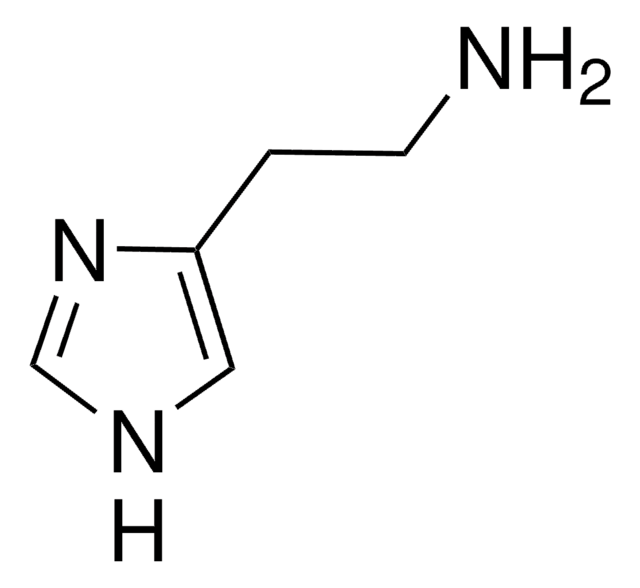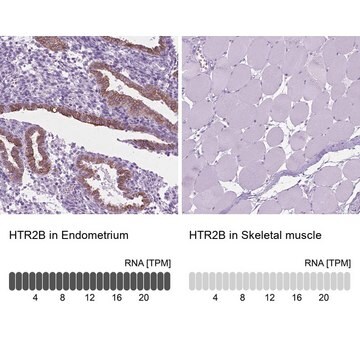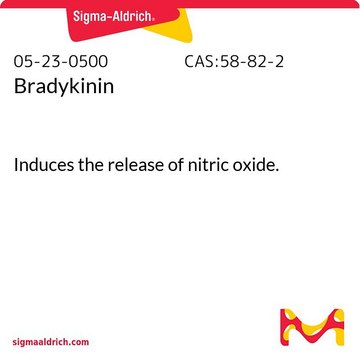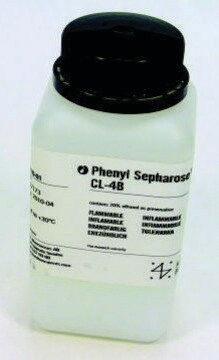GW21317
Anti-RGS12 (ab1) antibody produced in chicken
affinity isolated antibody, buffered aqueous solution
Synonym(s):
Anti-Regulator of G-protein signaling 12
Sign Into View Organizational & Contract Pricing
All Photos(1)
About This Item
UNSPSC Code:
12352203
NACRES:
NA.41
Recommended Products
biological source
chicken
conjugate
unconjugated
antibody form
affinity isolated antibody
antibody product type
primary antibodies
clone
polyclonal
form
buffered aqueous solution
species reactivity
rat, mouse, human
manufacturer/tradename
Genway 15-288-21317
technique(s)
western blot: suitable
NCBI accession no.
UniProt accession no.
shipped in
wet ice
storage temp.
−20°C
target post-translational modification
unmodified
Gene Information
human ... RGS12(6002)
Related Categories
General description
Regulator of G-protein signaling 12 is a protein encoded by the RGS12 gene in humans belonging to the RGS protein family. It is a nuclear protein that exhibits a unique pattern of subnuclear organization into nuclear foci or dots when expressed endogenously or ectopically. RGS12 consists of alternatively spliced PDZ domain by which RGS proteins may target specific G-protein-coupled receptor systems for desensitization.
Immunogen
Immunogen Sequence: GI # 38327601, sequence 1372-1447
Recombinant regulator of G-protein signalling 12 isoform 1
Application
Anti-RGS12 (ab1) antibody produced in chicken is suitable for western blotting analysis at a dilution of 1:500, for tissue or cell staining at a dilution of 1:200.
Biochem/physiol Actions
Regulator of G-protein signaling 12 plays a role during alternative splicing and cell cycle-dependent mechanisms in expression and subnuclear targeting of RGS12 proteins. RGS12 possesses a novel structure and function in the nucleus and the biological activities are distinct from those of other members of the RGS protein family.
Physical form
Solution in phosphate buffered saline containing 0.02% sodium azide.
Disclaimer
Unless otherwise stated in our catalog or other company documentation accompanying the product(s), our products are intended for research use only and are not to be used for any other purpose, which includes but is not limited to, unauthorized commercial uses, in vitro diagnostic uses, ex vivo or in vivo therapeutic uses or any type of consumption or application to humans or animals.
Not finding the right product?
Try our Product Selector Tool.
Storage Class Code
10 - Combustible liquids
WGK
WGK 1
Flash Point(F)
Not applicable
Flash Point(C)
Not applicable
Personal Protective Equipment
dust mask type N95 (US), Eyeshields, Gloves
Choose from one of the most recent versions:
Already Own This Product?
Find documentation for the products that you have recently purchased in the Document Library.
Gongsheng Yuan et al.
Cell discovery, 6, 59-59 (2020-09-15)
Mitochondrial morphology and function are crucial for tissue homeostasis, such as for skeletal development, but the cellular and molecular mechanisms remain unclear. Here, we provide evidence that regulator of G-protein signaling 12 (RGS12) is present in the mitochondria of primary
Tapan K Chatterjee et al.
Molecular and cellular biology, 22(12), 4334-4345 (2002-05-25)
RGS12TS-S, an 1,157-amino-acid RGS protein (regulator of G protein signaling), is a nuclear protein that exhibits a unique pattern of subnuclear organization into nuclear foci or dots when expressed endogenously or ectopically. We now report that RGS12TS-S is a nuclear
T K Chatterjee et al.
The Journal of biological chemistry, 275(38), 29660-29671 (2000-06-28)
RGS proteins are GTPase-activating proteins for certain Galpha subunits, accelerating the shutoff mechanism of G protein signaling, and also may interact with receptors and effectors to modulate G protein signaling. Here, we report identification of 12 distinct transcripts of human
Anil Akturk et al.
Science advances, 8(42), eabq2826-eabq2826 (2022-10-20)
Inhibitory G proteins (GNAI/Gαi) bind to the scaffold G protein signaling modulator 2 (GPSM2) to form a conserved polarity complex that regulates cytoskeleton organization. GPSM2 keeps GNAI in a guanosine diphosphate (GDP)-bound state, but how GPSM2-GNAI is generated or relates
B E Snow et al.
The Journal of biological chemistry, 273(28), 17749-17755 (1998-07-04)
Regulator of G-protein signaling (RGS) proteins increase the intrinsic guanosine triphosphatase (GTPase) activity of G-protein alpha subunits in vitro, but how specific G-protein-coupled receptor systems are targeted for down-regulation by RGS proteins remains uncharacterized. Here, we describe the GTPase specificity
Our team of scientists has experience in all areas of research including Life Science, Material Science, Chemical Synthesis, Chromatography, Analytical and many others.
Contact Technical Service








